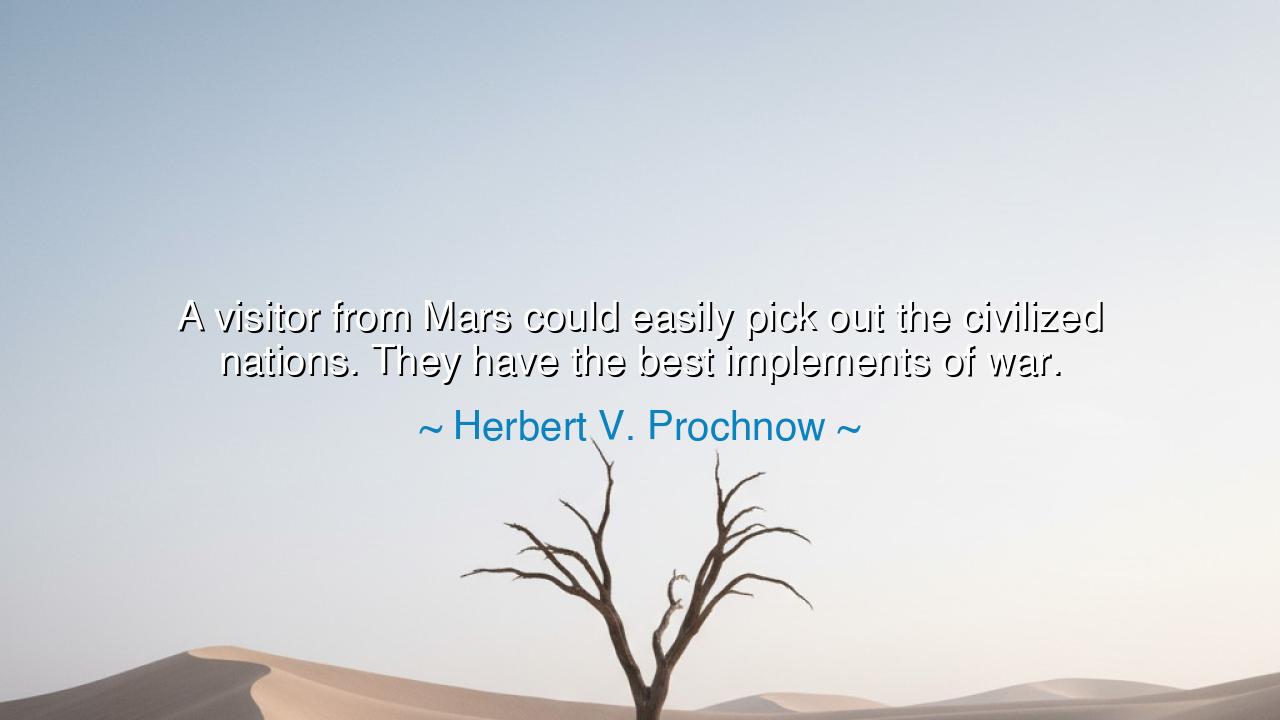
A visitor from Mars could easily pick out the civilized nations.
A visitor from Mars could easily pick out the civilized nations. They have the best implements of war.






Herbert V. Prochnow once spoke with biting irony: “A visitor from Mars could easily pick out the civilized nations. They have the best implements of war.” These words pierce like a blade, for they reveal the tragic contradiction of human progress. What is called civilization is measured not by compassion, wisdom, or justice, but too often by the perfection of weapons. To one who gazes from afar — as from another planet — the glory of our cities, the brilliance of our science, the refinement of our art may fade into the background, while the engines of destruction gleam most clearly.
This paradox has haunted humanity through the ages. The most civilized nations, with their universities, their monuments, their philosophies, have also been the ones to forge the deadliest swords, the most advanced cannons, the most fearsome bombs. Rome, which gave law and architecture to the world, also perfected legions that crushed nations beneath their sandals. Britain, which spread literature and science, also commanded fleets and muskets that carved an empire across continents. And in the modern era, America, a land of democracy and invention, became the master of the atomic bomb, a weapon so powerful it could erase not only enemies but the very fabric of life itself.
Prochnow’s words carry with them the bitter taste of satire. To imagine a visitor from Mars is to strip away human excuses and see ourselves with alien clarity. What would such a being see? Vast treasuries spent not on feeding the hungry, but on arming the soldier. Brilliant minds devoted not to healing the sick, but to perfecting the art of destruction. Nations competing not in mercy, but in how swiftly they might annihilate their rivals. By this strange measure, the most civilized are those most prepared for slaughter.
Consider the Cold War, when the United States and the Soviet Union poured their genius into creating missiles that could destroy the earth many times over. To an outsider, these nations might seem the most advanced of all mankind, for their laboratories forged marvels of engineering and science. Yet what was the fruit of their greatness? Not peace, but terror — the shadow of nuclear fire hanging over every city. Thus Prochnow’s words take flesh: the marks of the civilized nations were their implements of war.
And yet, within this irony lies a call to wisdom. If our greatest achievements are weapons, then our civilization is not yet whole. Progress that does not serve life is false progress. Greatness that arms itself for destruction is hollow greatness. The true measure of a nation is not the sharpness of its sword, but the breadth of its compassion, not the might of its armies, but the strength of its justice. Prochnow’s quip, though sharp with mockery, is a mirror held up to mankind, urging us to ask what kind of legacy we will leave.
The lesson, my children, is simple and eternal: let not your brightest minds be consumed with fashioning death. Let them instead labor for the healing of the earth, the uplifting of the poor, the uniting of nations. Strive to be known not for the implements of war, but for the instruments of peace — schools instead of cannons, hospitals instead of tanks, bridges instead of bombs. For if ever a visitor from the stars should walk among us, let them see not destruction gleaming in our hands, but kindness shining in our hearts.
Therefore, act in your own life with this wisdom. Celebrate not the roar of weapons, but the quiet work of compassion. Support leaders who value peace above conquest, who measure greatness by service rather than power. Teach your children that civilization is not the art of war perfected, but the art of peace fulfilled. Only then will Prochnow’s irony be broken, and the nations of the earth be known — not as the most armed, but as the most humane.






AAdministratorAdministrator
Welcome, honored guests. Please leave a comment, we will respond soon